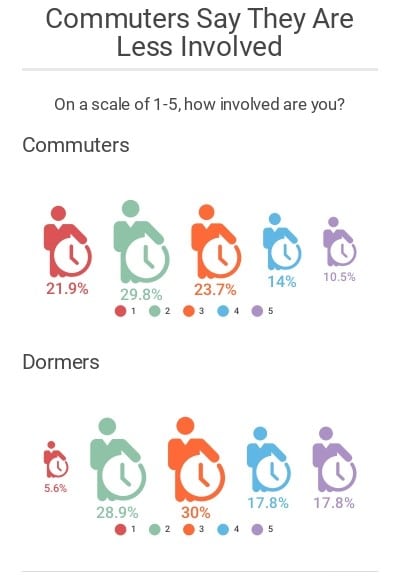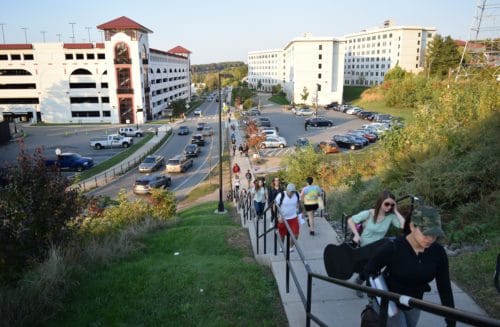Montclair State University has over 21,000 undergraduate students – but over two-thirds are commuters. The Montclarion talked to residents, commuters, university faculty and conducted a survey to examine commuter life at Montclair State.
Commuting Vs. Dorming at Montclair State from krista cerminaro on Vimeo.
Commuter Life Struggles | The Price Beyond Transportation | The “Halfsies” | Trying to Get Involved as a Commuter | Finding Friends | Lack of School Spirit | University Takes Action
How Commuting Affects College Life
An anonymous senior justice studies major is lucky if it takes him an hour to commute to campus, but typically, it takes him over 90 minutes. Some days, he goes straight from work to class, and can only catch a few hours of sleep because he spends three hours of his day in his car.
“I wish I lived closer and had more time for other fun stuff,” he said. “It’s not easy for me, but I know hard work will pay off in the end.”
This student is not alone in his struggle. Of 21,000 students at Montclair State, a full two-thirds are commuters, according to university statistics from the spring of 2016. In an age where more millennials are staying at home, and gas taxes are at an all-time high in New Jersey, many Montclair State students say that being a commuter defines their college experience and often prevents them from having the university life they imagined for themselves.
Although commuting does have financial benefits, a survey by The Montclarion of 192 Montclair State students and interviews with a broad range of students revealed that most commuters are feeling a strain on their college experience. They rate themselves as being generally uninvolved in campus life, forming friendships with only other commuters, and spending an excessive amount of time commuting back and forth to class.

192 respondents (53 percent commuters and 47 percent dormers) ranked their level of involvement in a survey.
Graphic made by Dan Falkenheim using Infogram
“I spent two years not being involved in anything on campus and just focusing on school and working,” said Massiel Ventura, a senior family and child studies major. “It drained me out because I didn’t have social support around me.”
“What’s hard about being a commuter is having to travel back and forth so many times a week,” added Ventura. “Sometimes hanging out at night isn’t convenient. During the day, I have nowhere to settle if I have a break. If I’ve spent a whole 12 hours on campus, I might be tired at night.”
The Montclair State administration is not unaware of this problem. They have made several initiatives to increase involvement for all students, but the understaffed commuter department is still trying to make its name known, and their efforts often go unnoticed by the student body.
“I’m a commuter and I have no clue what they are trying to do to help me,” said Ivan Bajceski, a senior justice studies major.
Not All About the Money
Commuting is without a doubt cheaper than dorming, even with the recent state-wide gas tax increase from 14 to 37.5 cents per gallon, but commuters say there is another price to pay: friendships are harder, there is limited time to be involved on campus and even sleep is sacrificed for the sake of commuting back and forth. Students sometimes end up asking themselves whether the dollar savings were worth it.
Commuters say they have to deal with a slew of other inconveniences that dormers rarely experience. According to The Montclarion’s survey, 70 percent of commuter students reported they travel up to 30 minutes each way to and from campus. In addition to that, many commuters report that they spend an excess amount of time on campus in between classes and struggle to stay involved in sports, clubs and organizations.
Priscilla Meray, a junior television production major, argued, “I don’t have time to hang out with people as long as I could. I’m spending more time studying than I am meeting people on campus.”
Stuck In-Between
The “Halfsies” from krista cerminaro on Vimeo.
What about the students who have moved out of their homes, but choose to commute from housing close to campus with their friends?
Often, they are left out of the binary scale of dormers vs. commuters.
While they reap the benefits of living without rules and regulations, they must also take responsibility for things that commuters don’t always have to deal with when living with their parents, such as paying bills and rent, grocery shopping and taking care of their house.
These “halfsies” have to deal with aspects of both dorming and commuting, compounding the issues they face on an everyday basis.
“I would say it’s not the ideal situation because we’re like a 10 minute drive from campus,” says Matthew Anders, a junior who lives off campus with his friends. “But I think for Montclair, it’s possibly the best you’re going to get.”
Making a Go of It
Some commuters make time to join organizations despite the demanding nature of commuting. Sasha Guerra, a senior justice studies major, joined Delta Xi Delta, a sorority on campus, so that she could feel a connection with her college and classmates.

The Commuter Lounge offers a space for commuters to congregate, but feeling involved with the campus community can still be difficult for some commuters. Photo by Luis Ari Lopez Wei
“I wanted to join a sorority so I would have a strong connection with something during my years here, and I felt like I hadn’t found that at [Montclair State] before joining,” said Guerra.
As a resident of Lodi, which is about 20 minutes away from campus, Guerra feels her experience as a commuter is somewhat different, but it does not take away from her connections with her sisters.
For Guerra, the hardest aspect of commuting is making the time to attend events which conflict with her schedule or require her to spend long stretches of time on campus. “The majority [of the events] are at night,” she said, “and it sometimes conflicts when I have a night class or when I have class in the afternoon and then have to come back at 10 or 11 [p.m.] for an event.”
Finding Your Lifelong Friends
Getting involved isn’t the only thing that commuters struggle with on a day-to-day basis. Many commuters report that they spend most of their time with other commuters, while dormers say that they typically make friends with other dormers, according to The Montclarion’s survey and student interviews.

Graphic made by Dan Falkenheim using Infogram
And, even when commuters and dormers form friendships with each other, hardships are not uncommon.
Amina Abdelrahman and Bre’yana Williams are good friends, but their time spent together is often cut short at the end of class when Abdelrahman, a junior communications studies major, goes to the parking garage and Williams, a junior communications and media arts major, heads back to her dorm.
“I feel like commuters can still make friends with people who dorm, but they often only hang out at school,” said Abdelrahman. “Once I go home for the day, I’ve got a lot of things to do, so I don’t come back to school to hang out.”
Williams added, “It kinda sucks getting to know someone and they’re a commuter because you want to hang out with them but can’t really do that since they’re not on campus all the time.”
No School Spirit
Aspects of life on campus that commuter students are absent from are sports and other major athletic events. Students who have long days of classes may have no interest in getting involved with extracurricular activities, because they say they have work to do for classes and a long commute home.
The lack of school spirit caused by an overwhelming burden of commuting is apparent, especially at sporting events where it’s at its highest for other schools.
Student athletes say they would appreciate it if more school spirit was promoted by those not just living on campus, but by students who commute as well.
“If more commuters went to games, it would bring the attendance up, which leads to a more enthusiastic environment,” said Blasé Mantineo, a senior and lacrosse player. “It would bring school spirit up because more people would be involved.”
Although the opportunities are there for students to enjoy the games, many commuters say the commute takes its toll, and other responsibilities, like homework and working, keep them from enjoying the fun on campus.
“Being a commuter and coming to school mainly for studying and certain school activities limits me from being able to go the games because my time away from the classroom or a club would be for work,” senior Kiarah Leite said. “Commuting between work and school, I think, gets in the way of going to sports activities because I’m not able to fit that into my schedule.”
University Takes Action

Antonio Talamo (pictured) has coordinated events like Commuter Appreciation Week and the “Commuter Corner” weekly podcast. Photo by Adrianne Natoli.
Montclair State University established the Department of Commuter Students Programs and Services to help make the experience of commuting more manageable and enjoyable.
Antonio Talamo was hired earlier this semester as the department’s new coordinator and envisions his office as being a one-stop information headquarters for the thousands of commuter students. He said he wants to meet students at freshman orientation and get them involved in programs and activities at Montclair State right from the beginning.
“We want them to stay here,” he said, “which is the ultimate mission.”
He started with boosting his office’s social media presence and coordinating events such as Commuter Appreciation Week and the “Commuter Corner” weekly podcast on WMSC.
“I’m working with parking services to come up with a comprehensive car-pooling program that is incentivized,” Talamo said. “There is one developed, but no one ever uses it because there is no incentive to it.”
The office has an open door policy, which allows all students to walk in and offer ideas, voice concerns and get answers for their questions.
“The car-pooling program actually came from a commuter student,” he said. “He just walked in here one day, had no idea who I was, and said, ‘I have an idea.’”
Talamo’s target goal is to change the notion that commuters are different from resident students. He rebuts the continual narrative by the commuter students with, “If you want it to be fun, you have to be a part of it.”
“We don’t hide from the issues,” said Talamo. “We know we have them. We just want to attack the issues. If the students don’t know it, it is our job to get them to know it.”
This story was written by Victoria Testa, Victoria Campisi, Krista Cerminaro, Daniel Collins, Luis Lopez Wei, Aleksandra Mufceska, Adrianne Natoli, Lucia Rubi Godoy, and Hannah Wigandt



